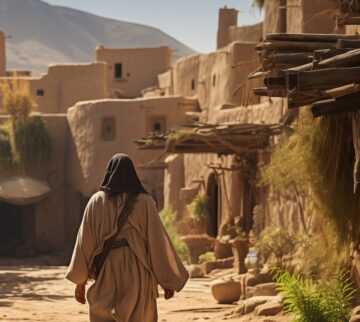Elijah was not a gentle prophet. He confronted kings, defied false religion, and called down the fire of God.
This behind-the-scenes post shares discoveries that shaped my novel Elijah: Fire from Heaven—and why this story still matters right now. I’ve included a short summary for those of you who don’t like longer articles.
If you’d rather jump straight into the story, you can read the novel here.
 Read the Novel: Elijah: Fire from Heaven
Read the Novel: Elijah: Fire from Heaven
Quick Summary (30 Seconds)
Elijah’s story is not only history—it is a warning, a call, and a reminder that God is never intimidated by power.
In Elijah: Fire from Heaven, you’ll step into a world where:
Faith confronts authority—and doesn’t back down.
Jezebel’s influence spreads like poison, using religion as control.
Jehu rises like a sword of judgment, bringing the house of Ahab to an end.
Elijah stands alone—yet never truly alone—because the living God is with him.
If you enjoy Biblical historical fiction with danger, intensity, and spiritual depth, this story was written for you.
Who was Elijah—truly? To many, he’s a wild prophet cloaked in camel’s hair, a thunderous voice from the wilderness calling down fire from heaven. But beyond the miracles, judgments, and divine confrontations, who was Elijah, and when did he live? These are some general notes to help any reader follow his general life journey. His story is not in chronological order, so during the three years in writing the Biblical narrative I utilized many timelines.
Elijah in Historical Context
Elijah’s ministry spans a particularly dark chapter in Israel’s history—during the reigns of Ahab and Ahaziah, kings of the northern kingdom of Israel. This places Elijah around 870–850 BC, during the 9th century BC.
Key dates and events:
• c. 874 BC – Ahab becomes king of Israel. He’d previously married Jezebel, daughter of the Phoenician king Ethbaal, while co-regent with his father King Omri.
• c. 870 BC – Elijah bursts onto the scene, proclaiming a drought in 1 Kings 17. He may have been a working prophet and teacher before this time.
• c. 866–860 BC – The drought ends; Elijah confronts the prophets of Baal on Mount Carmel (1 Kings 18).
• c. 859 BC – Elijah flees Jezebel’s wrath and journeys to be with God on Mount Horeb (1 Kings 19).
• c. 853 BC – Elijah anoints Elisha as his successor and confronts King Ahaziah (2 Kings 1).
• c. 850 BC – Elijah is taken up to heaven in a whirlwind (2 Kings 2).
Elijah the Man: More Than a Prophet
Though often remembered for his fiery miracles—calling down fire on Mount Carmel, raising the dead, or parting the Jordan—Elijah was also:
• A man of deep solitude. He lived by the brook Cherith, wandered through the wilderness, and spent 40 days in the desert, then time on Mount Horeb, the Mountain of God & Moses.
• A man of emotional depth. After great victories, he struggled with discouragement-even depression—crying out, “I have had enough, LORD. Take my life.” (1 Kings 19:4).
• A mentor. His relationship with Elisha reveals a tender, passing-the-torch moment. Elijah is not just a fiery prophet; he is also a teacher and a spiritual father.
• A man of courage. He stood alone against kings and mobs—utterly fearless when speaking the Word of God.
The Legacy of Elijah
Elijah’s influence echoes far beyond his lifetime:
• He appears with Moses at Jesus’ transfiguration (Mark 9:4).
• He is prophesied to return before the coming of the Messiah (Malachi 4:5).
• His spirit and power are echoed in John the Baptist (Luke 1:17).
His life was marked by confrontation—but also by obedience, vulnerability, and heavenly purpose. He was not merely a prophet of wrath, but of repentance and return.
Geographical Context:
From Wadi Cherith to Zarephath: A Prophet’s Journey
• Wadi Cherith (Wadi al-Far’a): East of the Jordan River
• Zarephath: A Phoenician coastal town between Sidon and Tyre
The distance between Wadi Cherith (Wadi al-Far’a or Wadi Fareth) and Zarephath is approximately: 85 to 100 miles (137 to 160 kilometers)
Depending on the exact locations used for each site and the route taken
Distance: ~85 to 100 miles
Travel time (on foot): 5–8 days
Route: Crossed Jordan, through Israelite territory, into Phoenicia — a dangerous journey fueled by obedience as he’s being hunted by Ahab, influenced by Jezebel.
Travel Time Estimate (Ancient Foot Travel):
• Distance: ~85–100 miles
• On foot: about 5 to 7 days, depending on pace and terrain
• The journey would involve:
o Crossing the Jordan River
o Traversing Israelite territory
o Entering Phoenicia (modern Lebanon)
Elijah: The Bold Prophet of Yahweh
“As the LORD, the God of Israel, lives… there will be neither dew nor rain… except at my word.” — 1 Kings 17:1
• Obedient in obscurity: Fed by ravens at Wadi Cherith (1 Kings 17:4–6)
• Emotionally honest: “I have had enough, LORD…” (1 Kings 19:4)
• Spiritually focused: “Let me inherit a double portion of your spirit” (Elisha’s request, 2 Kings 2:9)
Kings, Queens & Prophets: Character Through Scripture
Ahab: The Weak-Willed King
“There was never anyone like Ahab, who sold himself to do evil… urged on by Jezebel.” — 1 Kings 21:25
• Spiritually passive. At the same time a true politician and adept as a commander.
• Outwardly convicted, but never transformed (1 Kings 21:27) Ahab, the Master politician.
Jezebel: The Defiant Queen
“Jezebel was killing off the LORD’s prophets.” — 1 Kings 18:4
• Cunning and ruthless
• Mastermind of Naboth’s murder (1 Kings 21)
• Fulfilled Elijah’s prophecy in her violent death (2 Kings 9:33–37)
Elisha: The Loyal Successor
“He set out to follow Elijah and became his servant.” — 1 Kings 19:21
• Burned his past to follow the call
• Desired spiritual legacy (2 Kings 2:9) Jehu: God’s Avenger
“You are to destroy the house of Ahab…” — 2 Kings 9:7
• Fulfilled Elijah’s prophecy with zeal, but failed to fully walk with God (2 Kings 10:31)
Elijah’s Legacy in Scripture
• Appears with Moses at Jesus’ transfiguration (Mark 9:4)
• Foretold to return before the Messiah (Malachi 4:5) I’m unsure of how this is to be.
• Echoed in John the Baptist (Luke 1:17)

“How long will you waver between two opinions? If the LORD is God, follow him!” — 1 Kings 18:21
Elijah invites us to:
• Walk in bold faith
• Speak the truth with courage
• Pass the mantle to the next generation
In an age of compromise, Elijah’s cry still rings out—Choose this day whom you will serve.
If you wish to read Anthony Barbera’s latest Biblical novel: Elijah: Fire from Heaven. Come, step into the dramatic world of the prophet who defied kings and called down fire from heaven.
If you’d like to experience the full story—not just the research behind it—Elijah: Fire from Heaven is available now.
 Read the Novel: Elijah: Fire from Heaven
Read the Novel: Elijah: Fire from Heaven

1. Matthew 11:14 – “And if you are willing to accept it, he is Elijah who was to come.”
— Jesus refers to John the Baptist as the fulfillment of Malachi’s prophecy.
2. Matthew 16:14 – “They replied, ‘Some say John the Baptist; others say Elijah; and still others, Jeremiah or one of the prophets.’”
3. Matthew 17:3 – “Just then there appeared before them Moses and Elijah, talking with Jesus.” — At the Transfiguration.
4. Matthew 17:10–13 –
“The disciples asked him, ‘Why then do the teachers of the law say that Elijah must come first?’ … Jesus replied, ‘… Elijah has already come, and they did not recognize him …’ Then the disciples understood that he was talking to them about John the Baptist.”
5. Matthew 27:47–49 – During Jesus’ crucifixion:
“Some of those standing there said, ‘He’s calling Elijah.’”
6. Mark 6:15 – “Others said, ‘He is Elijah.’ And still others claimed, ‘He is a prophet, like one of the prophets of long ago.’”
7. Mark 8:28 – “They replied, ‘Some say John the Baptist; others say Elijah; and still others, one of the prophets.’”
8. Mark 9:4–13 –
o Elijah appears at the Transfiguration (v. 4).
o The disciples ask about Elijah’s return (vv. 11–13), and Jesus again identifies John the Baptist as fulfilling that role.
9. Mark 15:35–36 – During crucifixion:
“When some of those standing near heard this, they said, ‘Listen, he’s calling Elijah.’”
10. Luke 1:17 – “And he [John] will go on before the Lord, in the spirit and power of Elijah…”
11. Luke 4:25–26 – Jesus references Elijah’s time:
“Elijah was not sent to any of them, but to a widow in Zarephath…”
12. Luke 9:8, 19, 30 –
• People speculate Jesus is Elijah (v. 8, 19).
• Elijah appears at the Transfiguration (v. 30).
13. Luke 20:28–30 – (Minor reference through family lineage example used in a Sadducee question, not directly about Elijah.)
14. John 1:21, 25 –
• John the Baptist is asked, “Are you Elijah?” He said, ‘I am not.’”
15. John 6:14–15 – Some indirectly connected speculation about “the Prophet” to come, possibly alluding to Elijah or Moses.

16. Acts 1:10–11 – Not a direct Elijah mention, but the angel’s comment about Jesus returning “in the same way” has echoes of Elijah’s ascension language.
17. Acts 3:21–24 – Refers to prophets, possibly includes Elijah, though not by name.
18. Romans 11:2–4 – Paul references Elijah’s plea to God:
“Lord, they have killed your prophets and torn down your altars; I am the only one left…” — Citing 1 Kings 19.

19. James 5:17–18 –
“Elijah was a human being, even as we are. He prayed earnestly that it would not rain…”

20. Revelation 11:3–6 –
The two witnesses are described with powers reminiscent of Elijah and Moses (shutting up the heavens so it doesn’t rain, etc.), though Elijah is not named.
Gratitude,
Anthony Barbera






One Comment
Thank you for this, Anthony! I appreciate the work you put into bringing us the historical and geographical background of Elijah.
Now I see where Blake got his love of teaching the Bible within context.
I love how you pointed out the relevance of Elijah for us today with the reminder to pass on the knowledge of God and the example of living in humble obedience to him.
I am still enjoying my Elijah book. I kind of put reading on pause for a busy summer, other than daily Bible reading. I’m enjoying the new Bible reading plan from That You May Know Him.
Gratitude,
Christine Davis